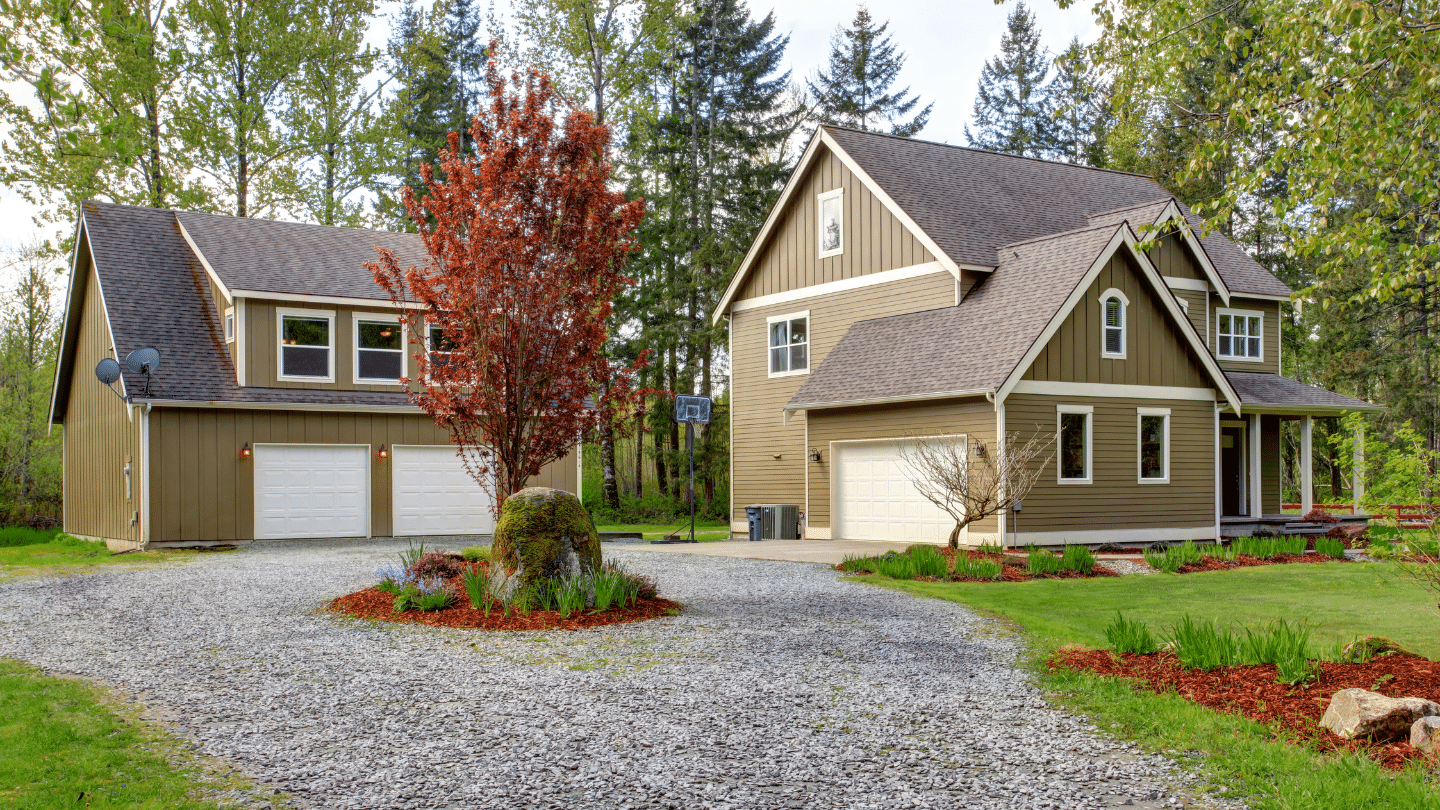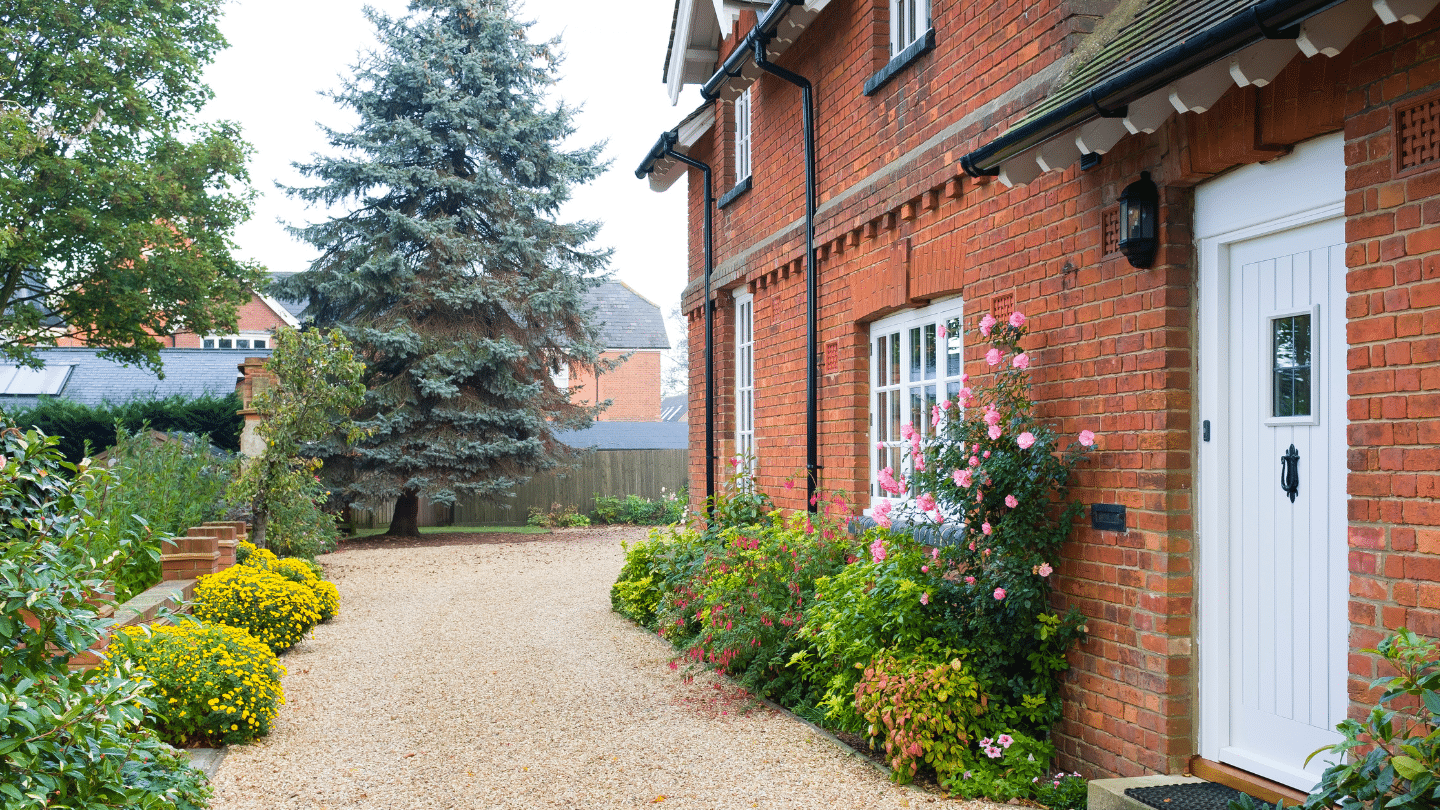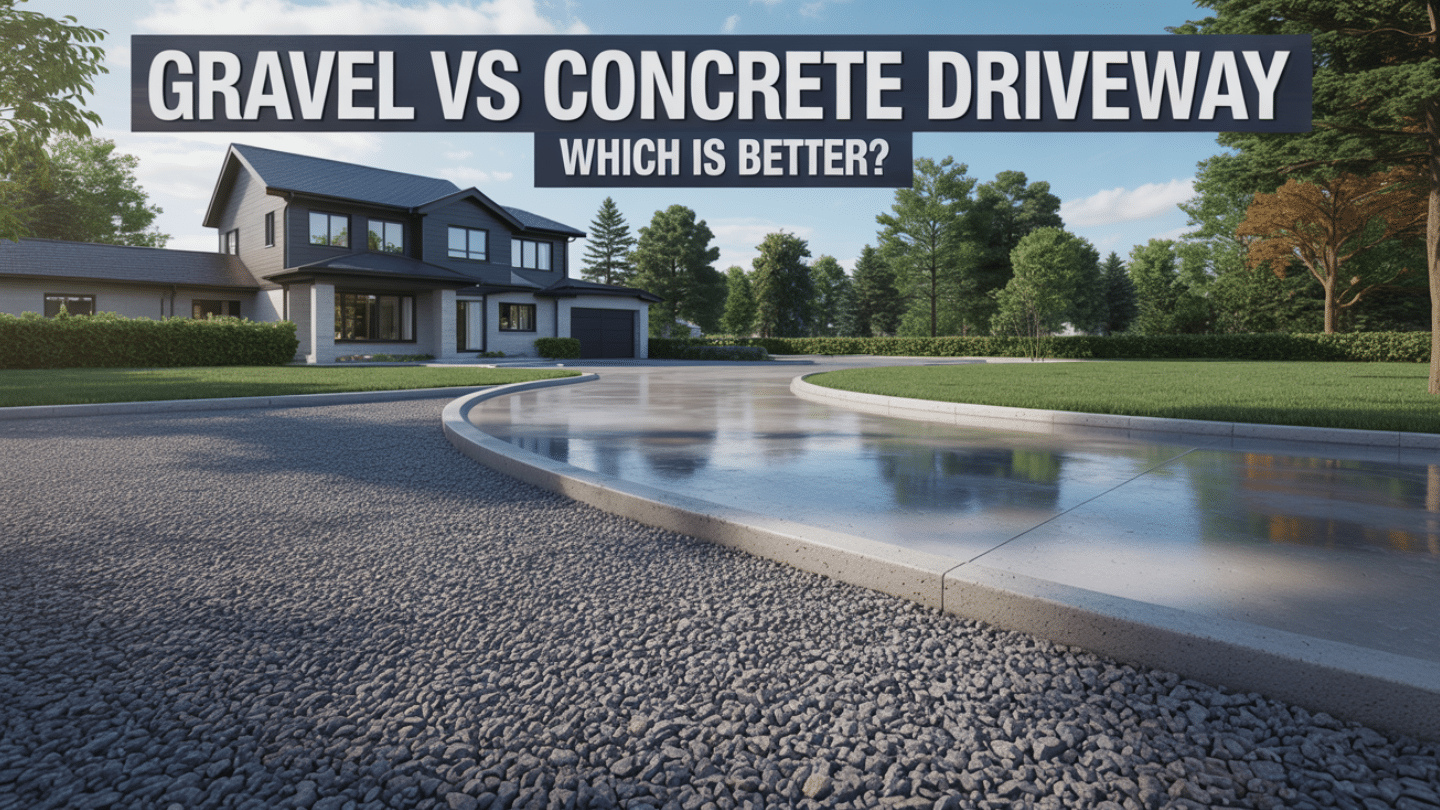Choosing the right driveway material is an important decision for homeowners, as it impacts both the functionality and curb appeal of your property. Gravel and concrete are two popular options, each offering unique advantages and challenges. From cost and durability to maintenance requirements and aesthetics, there’s a lot to consider before making your choice. In this blog, we’ll break down the key differences between gravel and concrete driveways to help you decide which one best suits your needs and budget.
Key Takeaways
- Gravel driveways are cost-effective, eco-friendly, and require minimal maintenance, making them a popular choice for homeowners on a budget.
- Concrete driveways are durable, long-lasting, and enhance curb appeal, but come with higher installation costs and maintenance requirements.
- Choosing between gravel and concrete depends on your needs and preferences, including cost, aesthetic appeal, and climate considerations.
Understanding Gravel Driveways
A gravel driveway is essentially a surface made up of loose gravel or small stones, typically composed of crushed stone or gravel. One of the reasons gravel driveways are so popular is their affordability. They require less material and labor than traditional paving options, making them a cost-effective choice for many homeowners.
Gravel driveways are eco-friendly because:
- They offer a natural, porous surface that enhances drainage.
- This makes them suitable for areas with heavy rainfall, reducing drainage issues compared to other materials.
- The natural materials used in gravel driveways have a lower environmental impact during production.
Gravel driveways offer a range of colors, sizes, and textures, enabling homeowners to enhance the aesthetic appeal of their property easily. Maintenance is relatively minimal, requiring only occasional raking or replenishing to maintain their appearance. Moreover, gravel’s flexibility allows it to adapt to temperature changes, preventing significant damage from freeze-thaw cycles. When considering which gravel to use for your driveway, it’s important to factor in drainage needs, durability, and how different gravel types complement your property’s overall look.
Read more: Planning Your Perfect Driveway Layout with Crushed Rock
Understanding Concrete Driveways
Concrete driveways are made from a mixture of:
- Cement
- Water
- Sand
- Gravel
They offer a durable and stable surface for your vehicles. One of the standout features of concrete driveways is their ability to withstand heavy loads, making them ideal for high-traffic areas and heavy vehicles.
Concrete driveways boast longevity, lasting between 20 and 30 years with proper care and installation, making them a long-term home investment. The smooth and uniform finish of concrete also enhances the overall curb appeal of your property, providing a clean and modern look that many homeowners find attractive.
Professional installation is critical for concrete driveways to ensure the right mix and proper curing, which maximizes durability and longevity. Despite their benefits, concrete driveways can be more expensive and require more maintenance than gravel driveways.
Maintenance Requirements

Regular maintenance for gravel driveways includes periodic raking to maintain an even surface and prevent ruts, as well as weed control to preserve structural integrity. Their excellent drainage helps prevent water buildup during heavy rainfall, maintaining optimal conditions that require frequent maintenance and routine maintenance.
Occasional top-ups and re-leveling are needed to counteract natural settling and wear. Frequent weed control during summer months is also necessary, but overall, gravel driveways are relatively easy to maintain when installed correctly.
Concrete driveways require regular cleaning, sealing, and timely crack repairs to preserve appearance and prevent damage from cracking. Sealing protects against environmental wear and stains, and regular cleaning keeps the driveway looking fresh.
Durability and Lifespan
Known for their resilience, concrete driveways can withstand heavy vehicle use and harsh weather. With proper maintenance, they last between 20 and 30 years, making them a durable option in the long run.
Gravel driveways, while cost-effective, typically require replenishment every 5 to 10 years due to wear and displacement. However, modern paver technology can stabilize gravel, eliminating common issues like ruts and pooling, and enhancing its durability. Despite this, gravel can shift or wash away during severe weather, necessitating more frequent maintenance.
Climate Considerations
Climate plays a crucial role in determining the suitability of driveway materials. In colder climates, gravel driveways are advantageous due to their resistance to shifting during freeze-thaw cycles. Conversely, concrete driveways can develop surface cracks over time unless specially treated.
Gravel driveways are better suited for areas with heavy rainfall due to their better drainage, which prevents standing water and reduces erosion risk. However, heavy rains can wash away gravel.
In regions with heavy snowfall, gravel driveways can pose challenges for snow removal and plowing without losing gravel, adding another layer of consideration for homeowners. Additionally, the use of a plow can help mitigate these challenges.
Read more: Why Gravel Works Best for Winter Driveways
Environmental Impact
Gravel driveways have a lower environmental footprint. Their permeable design promotes groundwater recharge and effective stormwater management, reducing erosion and flooding risks. Locally sourced gravel minimizes transportation emissions, enhancing eco-friendliness.
In contrast, concrete production contributes significantly to global CO2 emissions, accounting for around 8% of total emissions. Non-permeable materials like concrete can exacerbate water runoff, leading to potential flooding issues in building areas.
Overall, gravel driveways are generally less resource-intensive and more sustainable compared to concrete driveways.
Installation Process
A gravel base is easier to install and remove compared to concrete, offering greater flexibility. Installing a concrete driveway requires a skilled contractor for proper mixing and curing. Professional installation ensures maximum durability and longevity. Additionally, concrete driveways need several days to cure before use.
Gravel driveways are budget-friendly and offer flexibility, as they are easier to install and remove compared to concrete. Concrete driveways, on the other hand, provide durability and longevity. However, they require several days to cure before they can be used.
Aesthetic Appeal and Customization

Concrete driveways offer numerous aesthetic options and customizations, including:
- Stamping and staining to mimic other materials, providing various finishes and designs that enhance curb appeal
- Choosing from geometric and freeform designs
- Incorporating pigments for vibrant colors, including colored concrete
- Adding textured finishes like exposed aggregate and stenciled patterns to add visual interest
Gravel driveways offer a variety of colors, sizes, and textures, complementing any landscape property. This flexibility allows homeowners to create a unique look that fits their aesthetic preferences while remaining budget-friendly. Gravel offers a practical solution for enhancing your property.
Read more: Consideration for Your Landscaping Needs: Different Types of Gravel
Resale Value Impact
A concrete driveway enhances a home’s curb appeal and first impression, making it desirable for prospective buyers. Its modern and clean appearance can boost property value by 5-10%. The durability and low maintenance also attract buyers, increasing overall desirability.
Gravel driveways are generally not seen as premium materials and may not add as much value to a property. While practical and cost-effective, they don’t offer the same level of curb appeal or marketability as concrete. However, landscaping elements can enhance their visual appeal, potentially offsetting some of this stigma.
Which Driveway is Right for You?

Choosing between gravel and concrete driveways ultimately depends on your personal preferences and specific needs. Gravel driveways are often preferred for their affordability, flexibility, and ease of maintenance. They are practical and can be customized to enhance the aesthetic appeal of your property.
On the other hand, concrete driveways offer a smooth driving surface that is durable and long-lasting. While they can develop issues like cracks and stains over time, their modern and clean appearance can significantly enhance your home’s curb appeal, especially with a new driveway.
Homeowners often face a tough choice between these two driveway materials due to their respective advantages and disadvantages.
Wrapping Up
In summary, both gravel and concrete driveways have their unique advantages and drawbacks. Gravel driveways offer a cost-effective, eco-friendly option with excellent drainage and customization possibilities. Concrete driveways, while more expensive, provide a durable and aesthetically pleasing surface that can boost your home’s value and curb appeal.
When making your decision, consider your budget, maintenance preferences, and the specific needs of your property. Whether you choose concrete or gravel in Johns Creek, a well-maintained driveway can enhance the overall functionality and beauty of your home. For professional advice and quality materials, consider reaching out to Mulch Pros. Contact us to create the perfect driveway for your home. Along with our driveway services, we also offer mason sand, pea pebbles, river sand, and granite dust for your landscaping and construction needs.
Frequently Asked Questions
How often do gravel driveways need maintenance?
Gravel driveways typically need maintenance every 1-3 years, including raking and adding fresh gravel to keep them looking good and functioning well.
What is the typical lifespan of a concrete driveway?
A concrete driveway typically lasts between 20 and 30 years if you take good care of it. Regular maintenance really makes a difference!
Are gravel driveways environmentally friendly?
Absolutely! Gravel driveways are environmentally friendly because they allow for groundwater recharge and are made from natural materials that have a lower impact on the environment.
Can gravel driveways handle heavy vehicles?
Yes, gravel driveways can handle heavy vehicles if they are properly installed with a solid base. However, frequent use by heavy vehicles may require more regular maintenance to prevent ruts and displacement.
How long does it take to install a concrete driveway?
Installing a concrete driveway typically takes 1-2 days, but the concrete needs an additional 7-10 days to fully cure before it can be used. Proper curing is essential for durability and longevity.


